I’m expecting that half of the train’s passengers will disembark at Kozhikode. Not so. To get off we must push through a static huddle of travellers and dig out our bags, which are now under a pile of others by the toilet. Over the years, we’ve adopted the tactic of holding back when we arrive at a destination. Let the mob disperse together with the porters, taxi and rickshaw drivers touting for business. We find a tea stall and take stock. A taxi driver approaches us but we can’t agree on a price to our homestay on the outskirts of town (R600 for 5km. Ha!). Rickshaws aren’t allowed to operate on the concourse but we find one who’ll take us to our destination for R150 but he has to board us around the corner and on the other side of a very busy road and along an unmade pavement. The walk with the bags is exhausting.
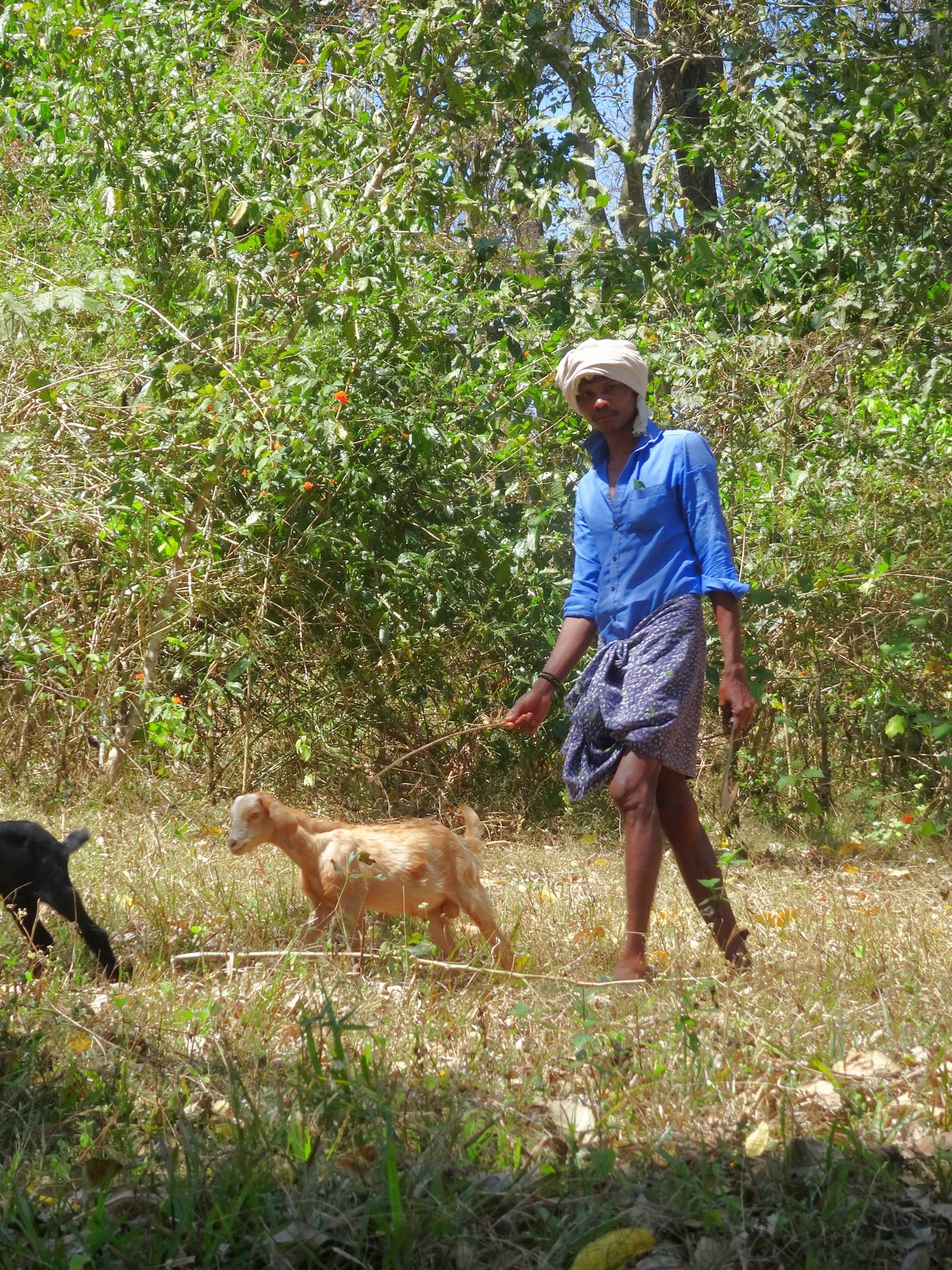
We have another very pleasant room in a homestay with a big sunny concrete roof terrace littered with empty brandy bottles. We’re up here in the late afternoon, enjoying the view and we can hear soundchecks on a very big sound system. On a short walk into town we pass a lane decorated with streamers and lights. This evening there will be a local community song and dance festival.
After an excellent vegetarian curry cooked by the lady of the homestay we walk to the festival site where we are enthusiastically greeted as minor dignitaries. Many smiles, namastes, waves and handshakes before we are shown to our seats. The sound system is huge with stacked speaker cabs framing an impressively illuminated and curtained stage.
The evening begins with delightful traditional Indian dance performances by mature women and some, with a contemporary twist, danced by teenagers. There’s a short, two act comedic play featuring a small cast of men set at a street stall. The final performance of the evening is to be a seven piece band (including tablas, drums, guitar, violin, keyboards) supporting guest vocalists.
During another protracted soundcheck I appraise our fellow guests of which we are the only obvious foreigners. Seated are mostly women and children, dressed in their Sunday best. The men are standing in a large group on a raised track to one side of the seated audience. Men, some drunk, some sporting official looking rosettes, approach us with enthusiastic greetings. An old drunk with a rosette greets Jo a little too enthusiastically. Our host from the homestay is here. I think he’s been at the brandy on his roof terrace. There is no alcohol for sale at the venue. All the boozing is done surreptitiously, here or at home.
The main act is simultaneously interesting, funny and ludicrous. The all male band soundcheck (which they were doing this afternoon) takes ninety minutes. Starting with the tablas, every instrument is configured a notch louder than the previous one. A male vocalist intones ‘one, two, check’ every few minutes for 60 minutes so that he is constantly ratcheted above the competition. When the guy at the mixing desk is happy, the tabla player requests another check and all the instruments are configured again. The end result of this process is every instrument cranked to its highest possible ear splitting volume.
Whilst all this is happening the crowd is getting restless. A fight breaks out amongst a few drunks. Jo is besieged by a succession of amused children who want to practise their English and take selfies with her.
Finally, after the band members’ competitive egos have been assuaged, they’re ready to begin. A woman walks on stage – the first guest vocalist. She speaks into her microphone which doesn’t work. A roadie jumps onstage and switches it on and says ‘one two check’. This woman, who has been given no opportunity to soundcheck anything proves to be the best act of the entire night. Despite the band drowning her out, with a powerful mellifluous voice she sings a couple of traditional Malayalam songs. She is followed by Mr OneTwoCheck – tall, slim, moustache, sharply creased trousers, shirt cuffs turned back a couple of folds. He’s a man of some self appointed importance. I tell Jo I think he paid for the whole show, on the proviso that he could perform. Even when not singing he stands upstage sending important text messages.
Then Beyonce (mirror Raybans, fabulously long hair) and Enrique Englesias (designer stubble, gyrating hips) take the stage. They begin an impossibly loud number, jump offstage, move amongst the crowd, clapping hands above their heads, failing to work up any audience participation. Halfway through this wretched song they realise they can’t hear themselves think, so they stop. Beyonce, with an ‘I don’t have to put up with these amateurs.’ look, has a hissy fit. Enrique placates her and has a long talk with the drummer. They start again, nothing has changed, but Beyonce has had her diva moment and is happy. An old drunk, clearly having a wonderful time too, stumbles onto the stage and is bundled away by security.
At midnight my ears are beginning to ache. This awful noise will continue to 2am. We leave our seats, shake hands with more rosetted dignitaries and walk home. Tomorrow we will take our first Indian bus to the hills of Wayanad.
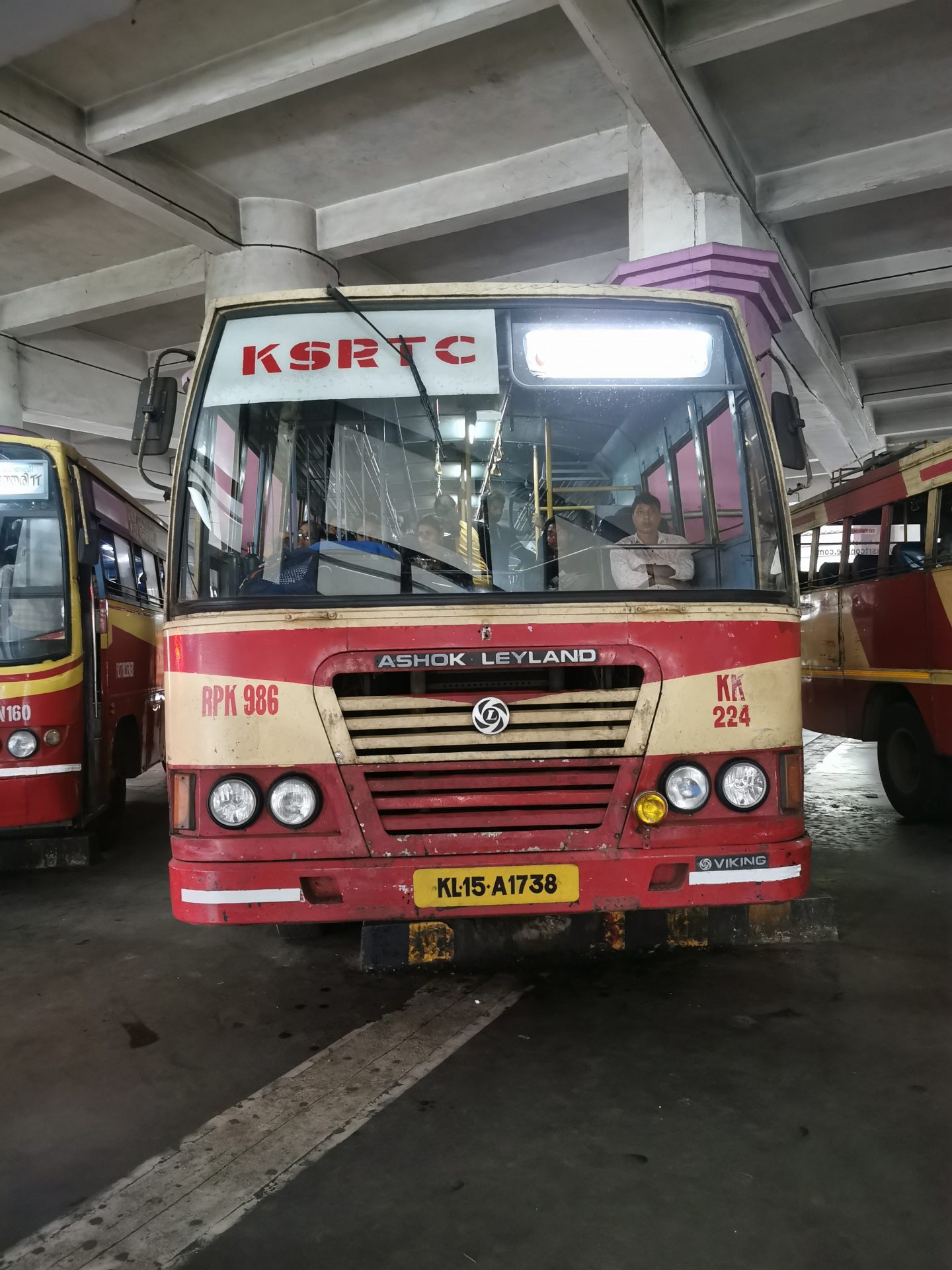
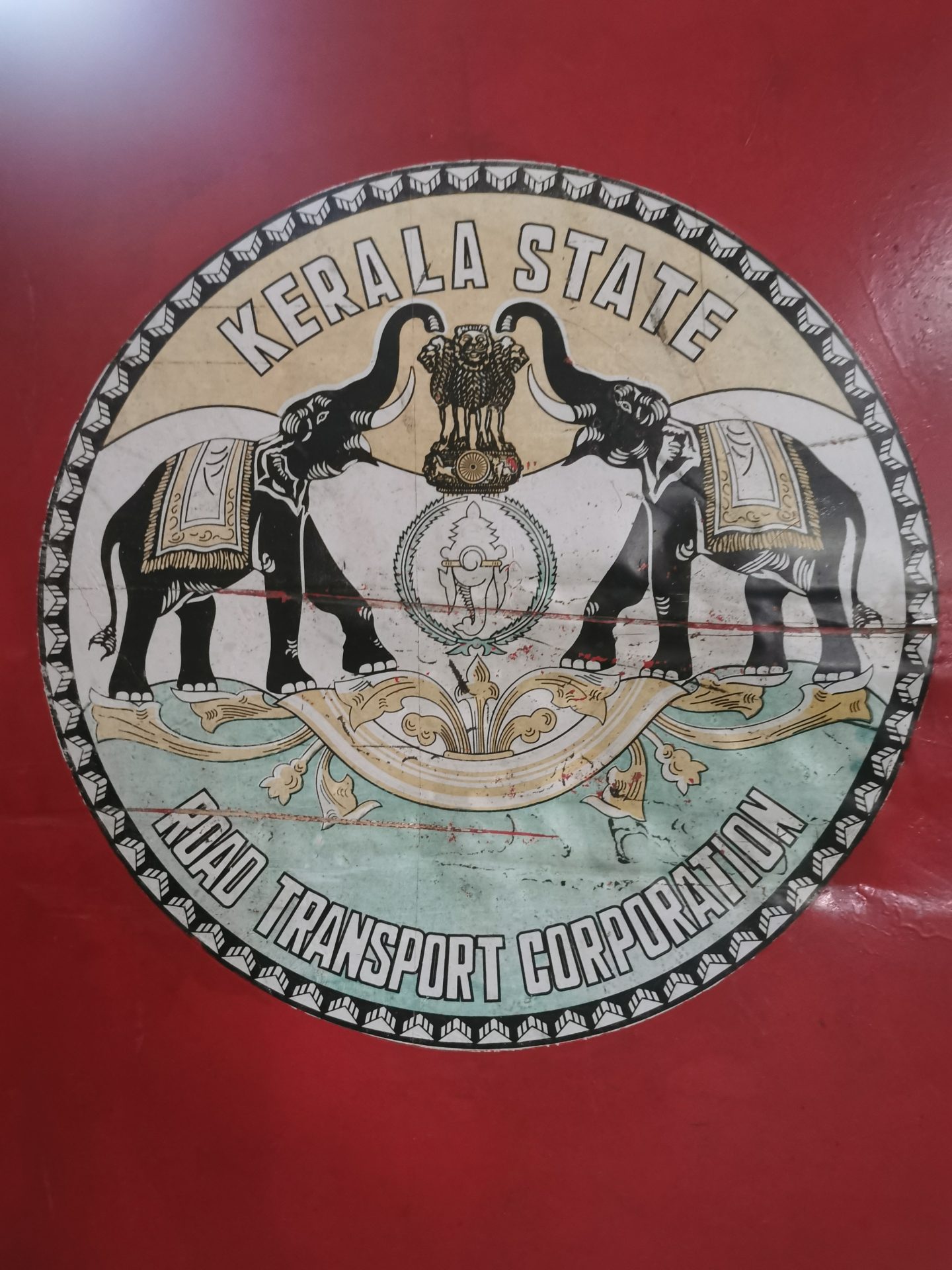
We’ve been in India for 21 days. Some years ago my friend Andrew Robinson told me that it takes 20 days to settle into a journey. At 20 days, a switch is flicked and you are somehow acclimatised to your travelling circumstances. I have found this to be strange but true. My itinerant condition is now normal. It’s not a problem, not even an inconvenience, to queue for an hour to get a ferry ticket, or to stand in the heat of a crowded train for three hours. I’ll comfortably stand my ground against the shoving mass of humanity at the rickshaw stand. I’m accustomed to the heat and the filth – like the locals I don’t notice the piles of stinking pi-dog scavenged rubbish (but unlike them I’ll hang on to a plastic bag for however long it takes to dispose of it in a bin). I’m inured to the incessant noise (the sound of India is not a bird or a cricket, it’s an angle grinder) So, paradoxically, despite all these discomforts I feel very relaxed indeed. These circumstances should be intolerable, even infuriating, but they’re not. This is perplexing. One explanation is that after several weeks you no longer do a country, so much as be in a country – especially if you warm to the people. There is no longer a compulsion to do this beach or that temple. Just to be here amongst Indians is more than enough – a walk through the town to the forest and the river, stopping for tea (black no sugar) on our return. It’s not in the guidebook.
I’m still enraged by events in the UK. This week, despite their fat pensions, generous leave entitlements and work from home ethos, university lecturers and 100,000 civil servants from 124 departments, are on strike. The numbers of this elite cohort are depressing aren’t they? Having let students down terribly during and after the Coronavirus pandemic, lecturers are now inflicting yet more harm. As for work shy civil servants, who’ll notice. The joke is that they may have had to go into the office to stand outside it to strike. I have no sympathy for these people.
On the plus side I’m so delighted to hear of the resignation of Scotland’s authoritarian woke first minister Nicola Sturgeon, who has inflicted such long lasting damage upon Scotland’s health care, education system and finances. She’s caused deep divisions by her relentless pursuit for Scottish independence despite the majority of Scots supporting the Union. Allowing a convicted rapist to masquerade as a woman and be admitted to a womens’ prison was the last straw. It’ll be great not to hear her condescending voice ever again.
See, I’m clearly happier in the Communist State of Kerala.
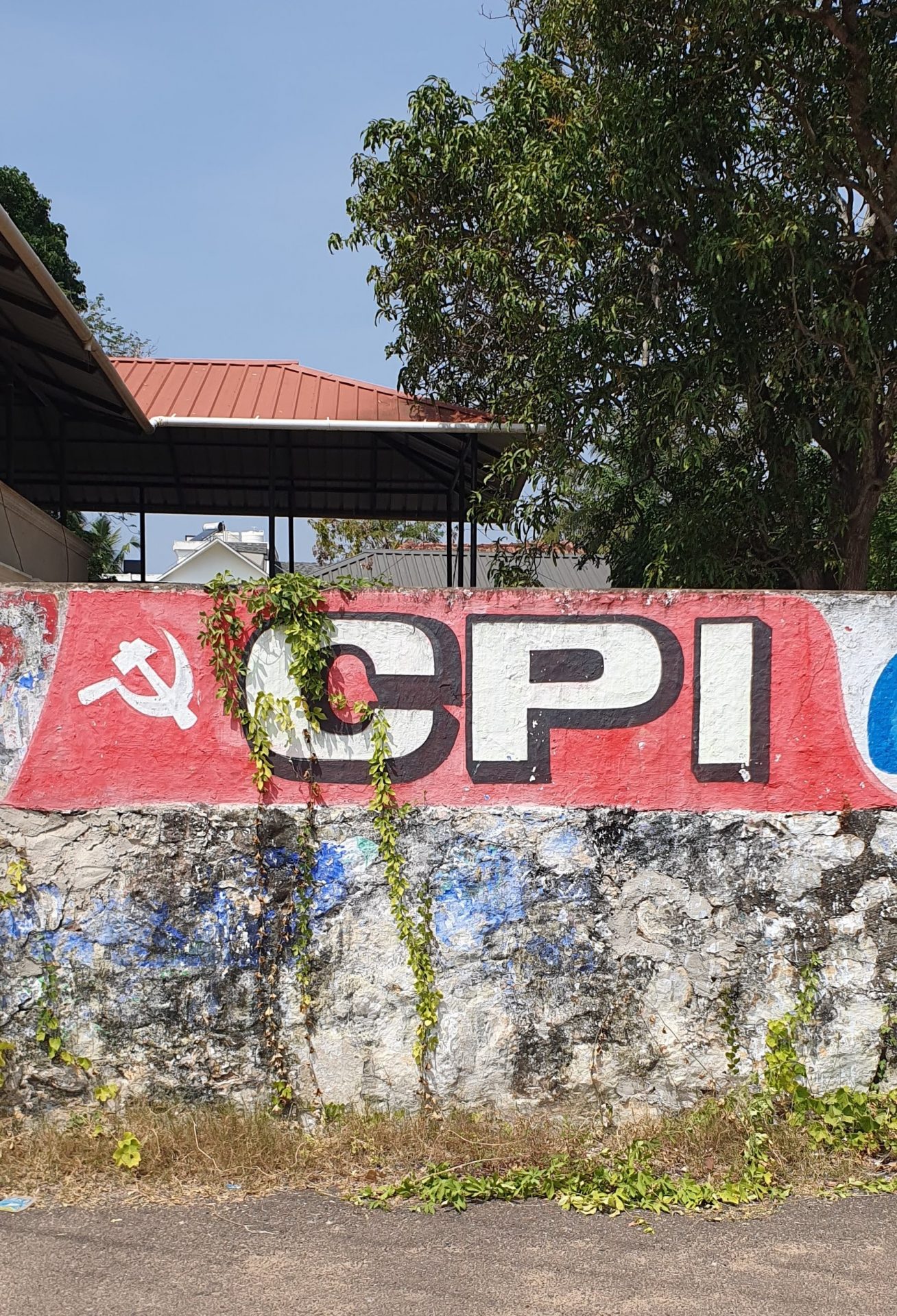
It’s a two hour bus ride up to Kalpetta, Wayanad and its Hill Stations in the Western Ghats of Kerala. The Western Ghats is a 1,600km long chain of mountains running parallel to India’s western coast, approximately 30-50 km inland. The bus driver is a lunatic and if it wasn’t for the fear of his god that he instils into oncoming drivers we’d not have lived to tell the tale. I’ve downloaded music onto my phone, so with earplugs I occasionally zone out of the ride. At one point on the twisting hairpins of our ascent we’re overtaken by eight police vehicles and two ambulances, horns blaring. Jo’s convinced there’s an accident on the mountain up ahead. I suggest that the cops are keen to get to Kalpetta for tea. Later, we see their vehicles parked outside Kalpetta nick, so my theory’s good. Jo has instantly fallen in love with the Indian bus. In addition to the fabulous views and excitement of the ride, the bus is where one can actually be part of the wonderful diversity of India’s peoples. When on a bus she has a constant smile on her face, and counter-intuitively she has no fear.
From Kalpetta it’s another bus ride to Mananthavady where we hire a rickshaw to take us to three locations; the Federal Bank ATM (The Fed is consistently successful at disgorging cash), the Beverages Corporation Outlet (off-licence), and our guest house in the hills. Total cost £3. At Angels Rest Guest House we must get out of the rickshaw and push it up the steep rocky track. There’s only a pack of three friendly dogs to greet us until an old chap with no English helps us with our luggage up to our mud hut. It is literally a hut made of mud but that doesn’t do it justice. It’s a big half brick, half mud bungalow with a semi-circular window and terrace overlooking a sweeping expanse of rice paddies and a background of rising palm and teak forests. It’s home for five days.
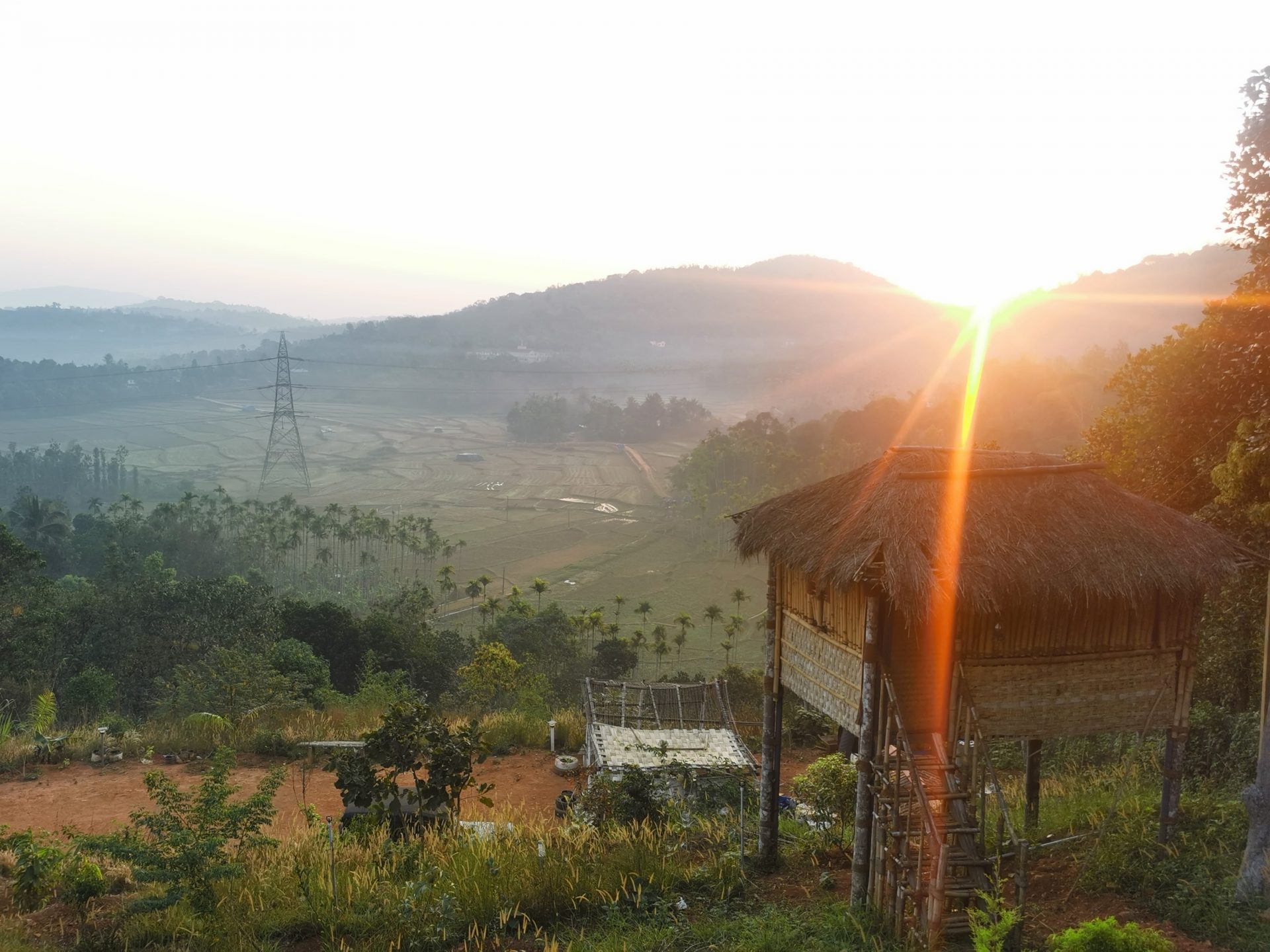
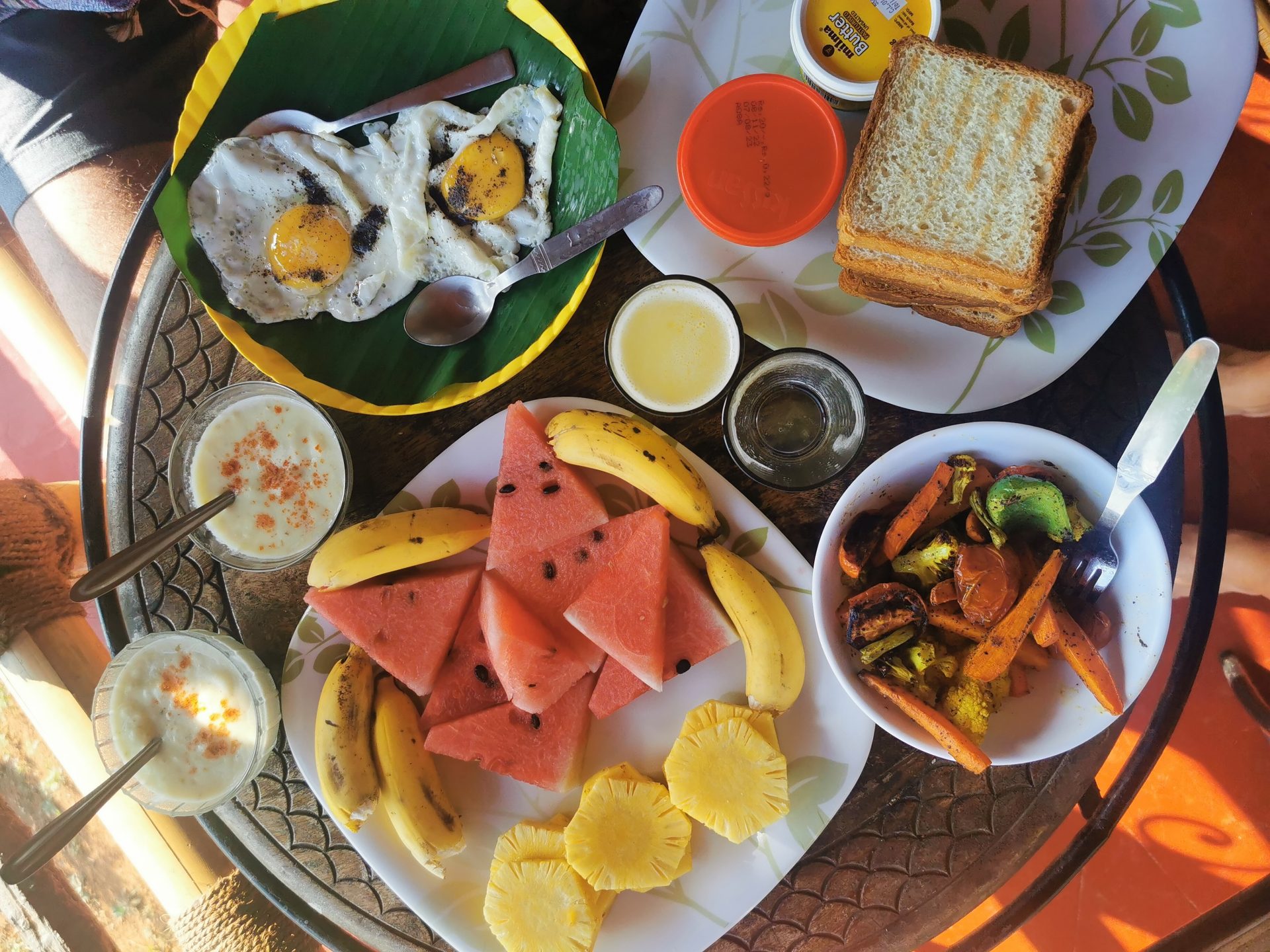
Our young, friendly, attentive and energetic host Vishnu arrives two hours later. He tells us that there’s a local festival happening later this afternoon and this evening. The Adivasi – Adivasi is the collective term for the tribes of the Indian subcontinent, who are claimed to be the indigenous people of India prior to the Dravidians and Indo-Aryans – are holding a thanksgiving festival on an open piece of land up in the hills. We are invited and Vishnu will give us a lift.
We arrive before the festival really gets underway. On one side of a forest clearing in the shade of a big canopy are seated residents of the small local town of Kattikulam. Vishnu introduces us to his mother. On the opposite side of the field are the Adivasi, mostly women and children, also sheltered from the sun but seated on the ground. There are stalls selling snacks, soft drinks, trinkets and toys. We are the only foreigners and are made to feel very welcome. There are several hundred people patiently waiting (Indians will patiently wait for many hours) for the festivities to begin. Vishnu takes us to a tent where theyyem performers are being decorated for their roles as gods. Several men are lying down whilst their faces are meticulously painted in bright primary colours and black. They’re friendly guys but after some minutes they politely ask to be left alone so that they can immerse themselves into their roles. When they emerge they’re wearing huge headdresses and elaborate bright red costumes hung with jewellery. Their eyes are bloodshot and their painted faces are adorned with metal studwork. The theyyem are not just dressed as gods, they and the Adivasi believe that they’re possessed by the deities.
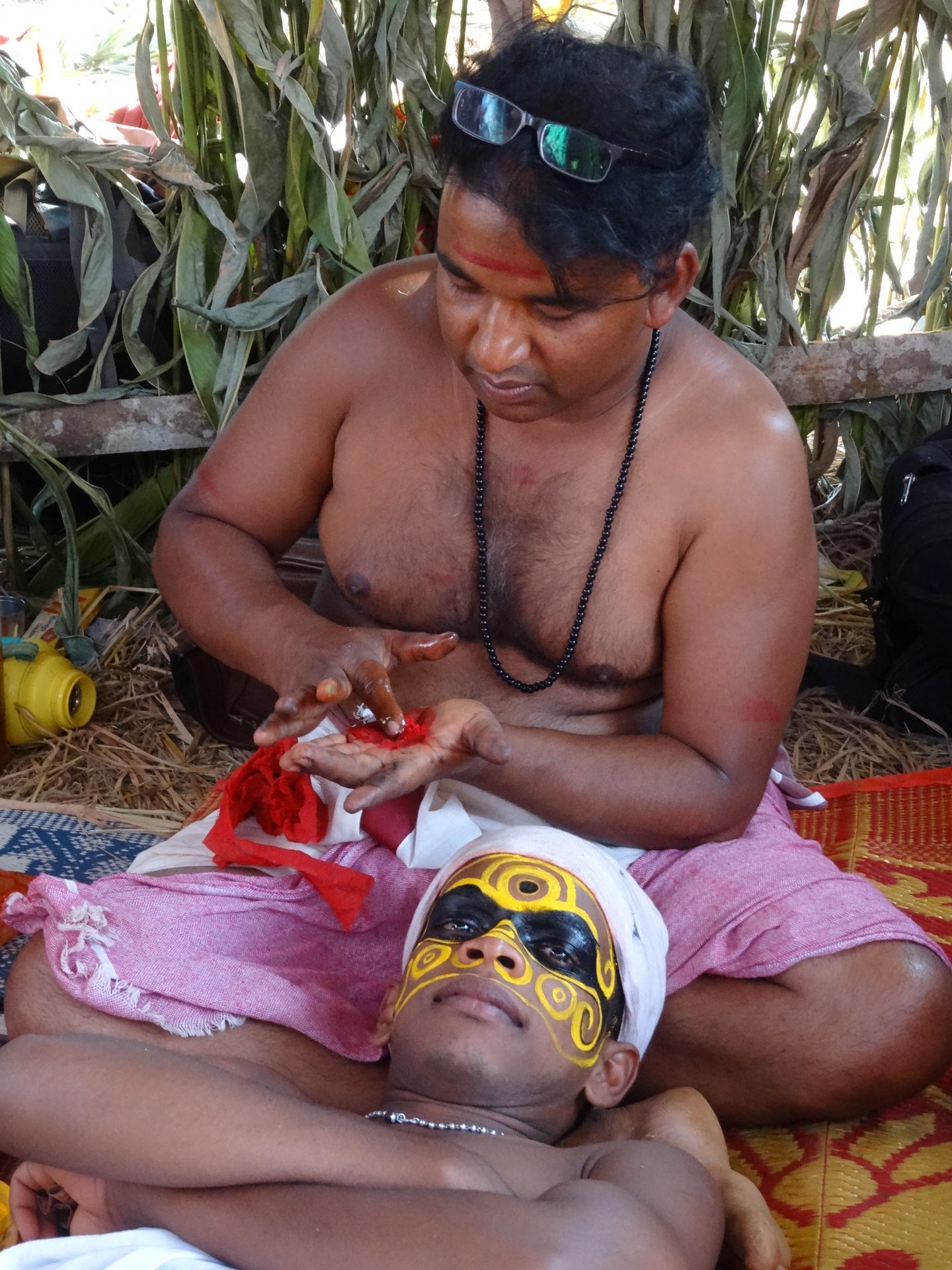
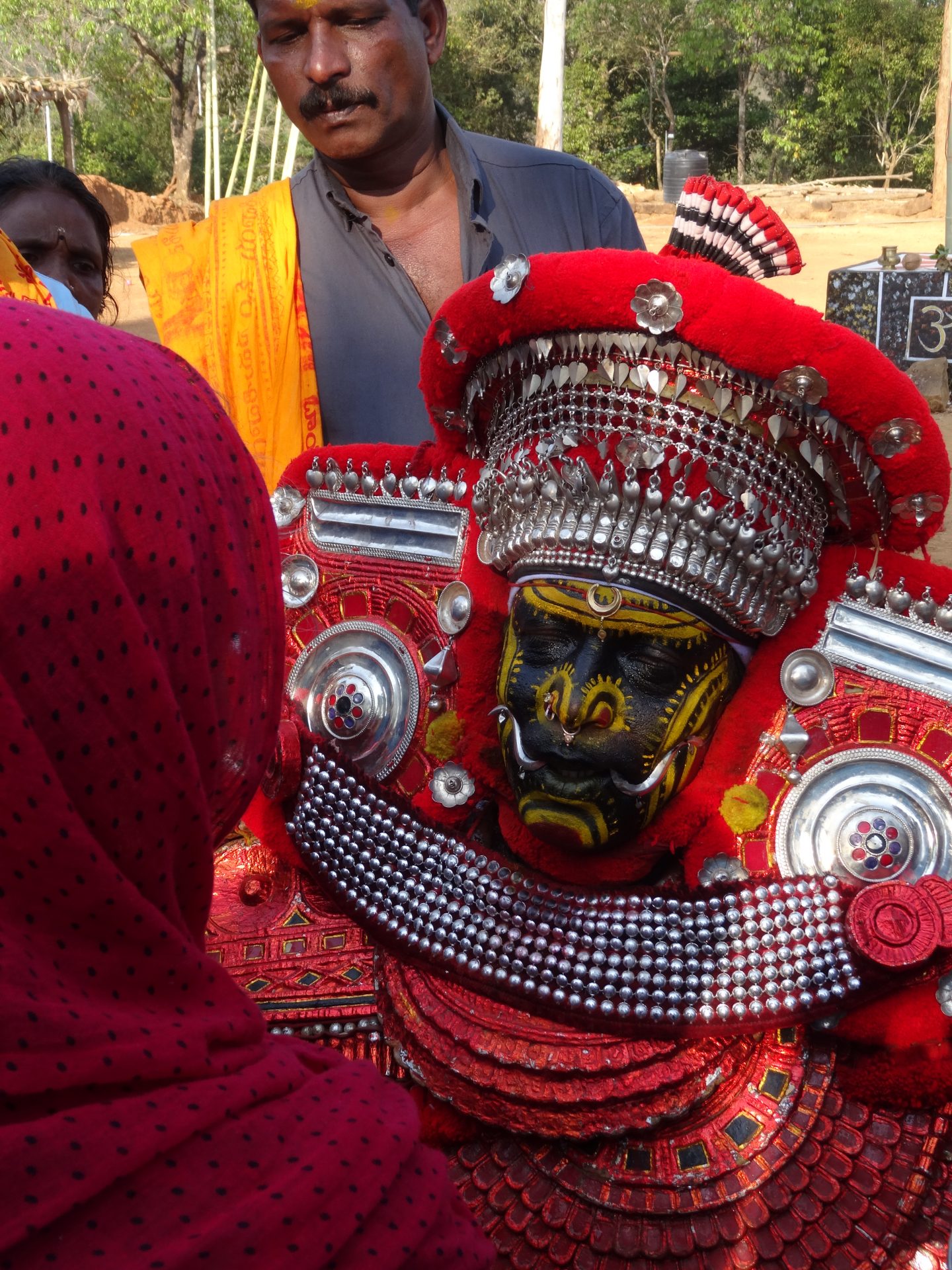
To the beating of tabla and dhol drums, the theyyem gyrate, dance and run as they are pursued by bare chested young men in dhotis. These men roll on the ground and work themselves into a frenzy. Blood is spilt. After a time the frenzy subsides and the most elaborately dressed theyyem moves among the crowd, its spirit glaring through his bloodshot eyes. Exuding a combination of terror and adoration he listens to peoples’ sins and problems offering advice and warnings. Then the chase is on again before the theyyem hand out grains of rice and blessings to everyone present.
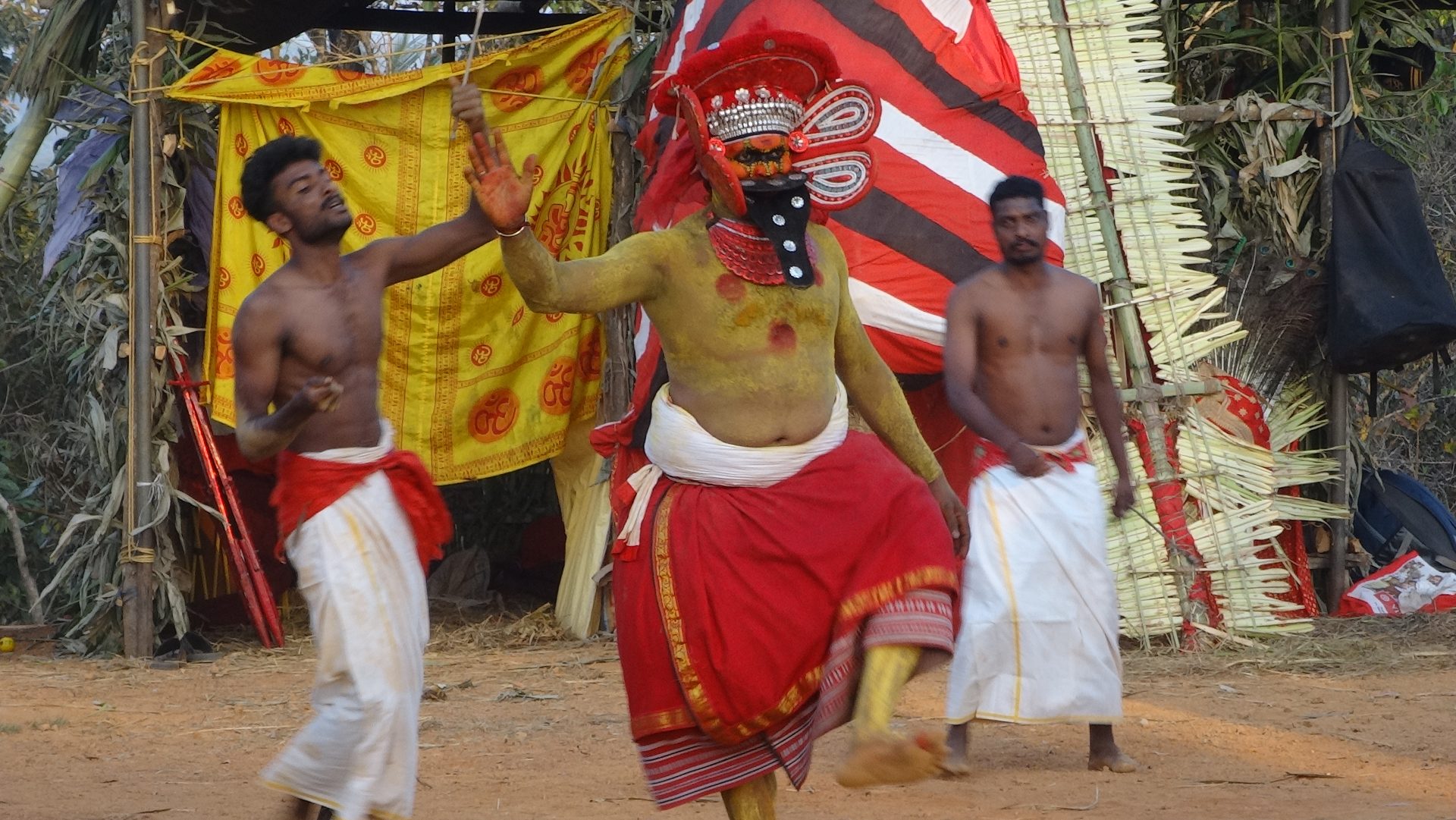
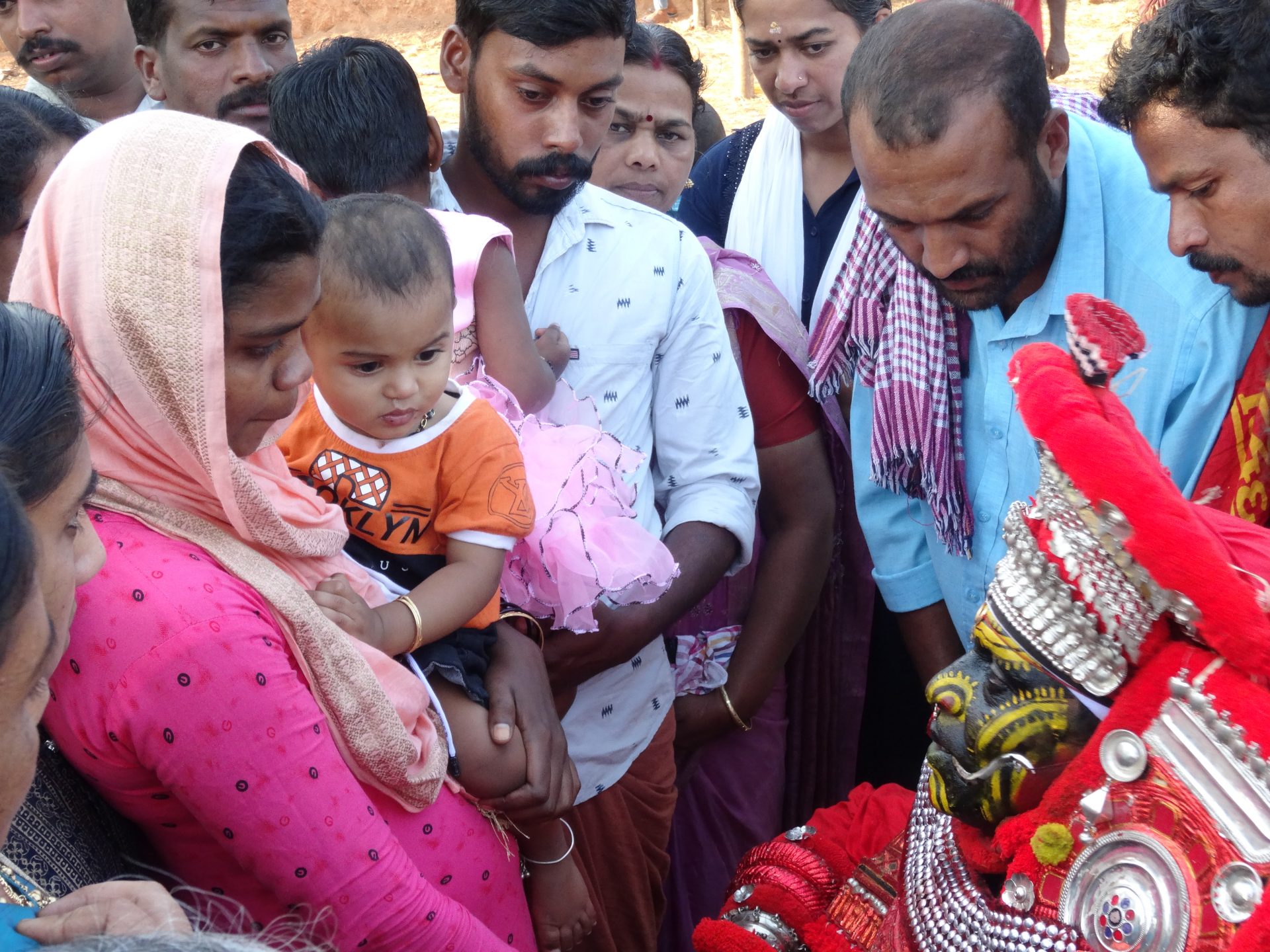
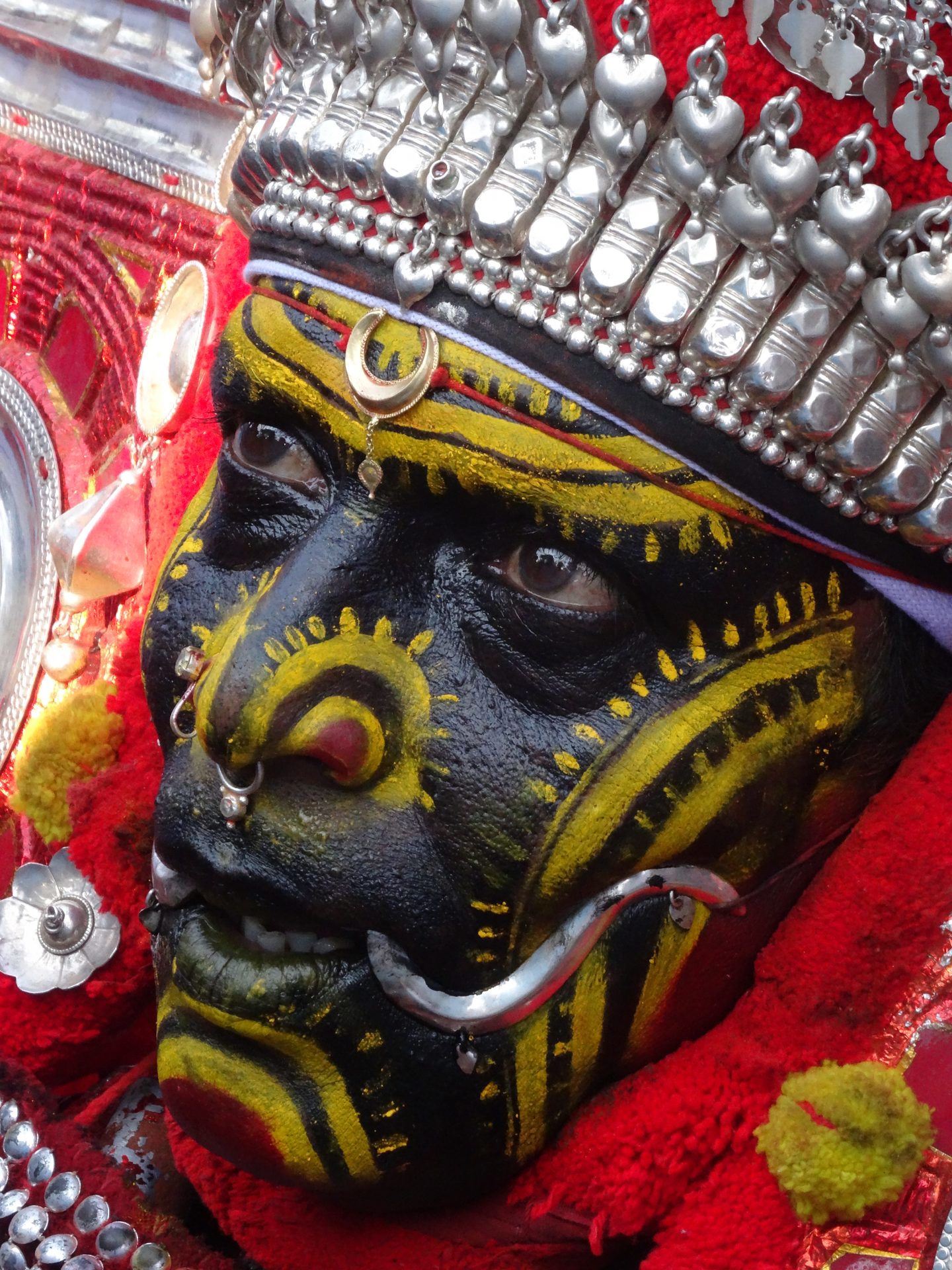
Our residency bungalow just outside Mananthavady is the sort of place in which you could stay for some time – if it only had a swimming pool. We walk 6 miles to a local river island beauty spot. The route through the forest takes us past a number of big contemporary villas – locally known as Gulf Villas. Generations of Keralans have worked in the Gulf States, initially in the 1960s and 1970s as construction workers but latterly as professionals such as doctors, software and civil engineers, bankers, lawyers. The monies remitted back to Kerala are in the millions and these grand houses are the result of some of those rewards. We don’t visit the small island in the river – but drink a very good Indian black tea at a local riverside cafe. After a hot walk back through the forest we stop for another tea at a corner cafe recommended by Vishu, in the small town of Kattikulam. Here we meet his Dad (‘I am Vishnu father’). He was the old chap who helped us with our bags when we arrived at Angels Rest. Vishnu’s Dad generously pays for our tea.
Vishnu gives us a lift, in his cherished 1985 Mahindra jeep, to Kattikulam where we board a bus to Kutta. Then another bus takes us, via Virajpet, to Madikeri, the principal town of a region called the Coorg (Kodagu). We are now in the state of Karnataka
I’m so grateful to the Irish travel writer Dervla Murphy for her 1976 book, On A Shoestring to Coorg. She travelled to the region with her five year old daughter in 1973 when Coorg life was on the cusp of dramatic and irreversible social change. She lived on the first floor of an old farmhouse near Virajpet for several months. Her descriptions of the countryside, the people, their clothes, food, customs, rituals and beliefs are wonderful. She fell in love with the place.
She writes in her introduction to the Coorg :The Coorgs were the only martial race on the subcontinent never to have taken up arms against the British Raj. In April 1834 the assembled leaders of Coorg requested to be ruled by the rules and regulations of the East India Company. The Mysore Gazetteer for 1965 gratefully points out that ‘Coorg was under British rule from 1834 to 1947, over a century and a decade. The benefits conferred by British rule were many and varied. The English built this state from a small loose knot feudal principality into a prosperous and well-administered unit.’ So here we have one Imperialist story with a happy ending, and I suppose most people have never heard of Coorg simply because ‘good news is no news.’ While all sorts of gruesome things were happening In the Punjab, or in Lucknow, Calcutta, Sind or Maharashtra, the British and the Coorgs were being awfully nice to each other.
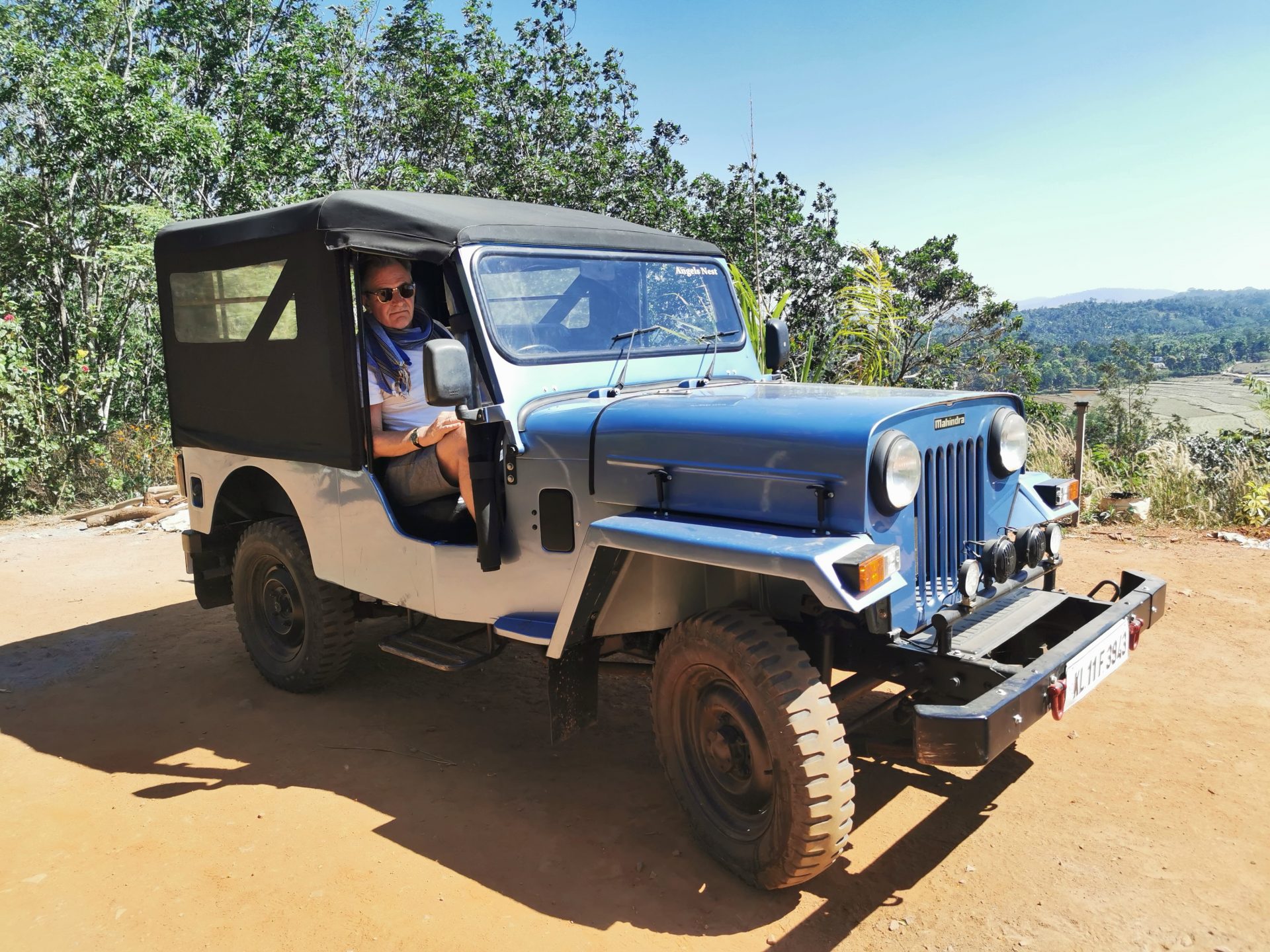
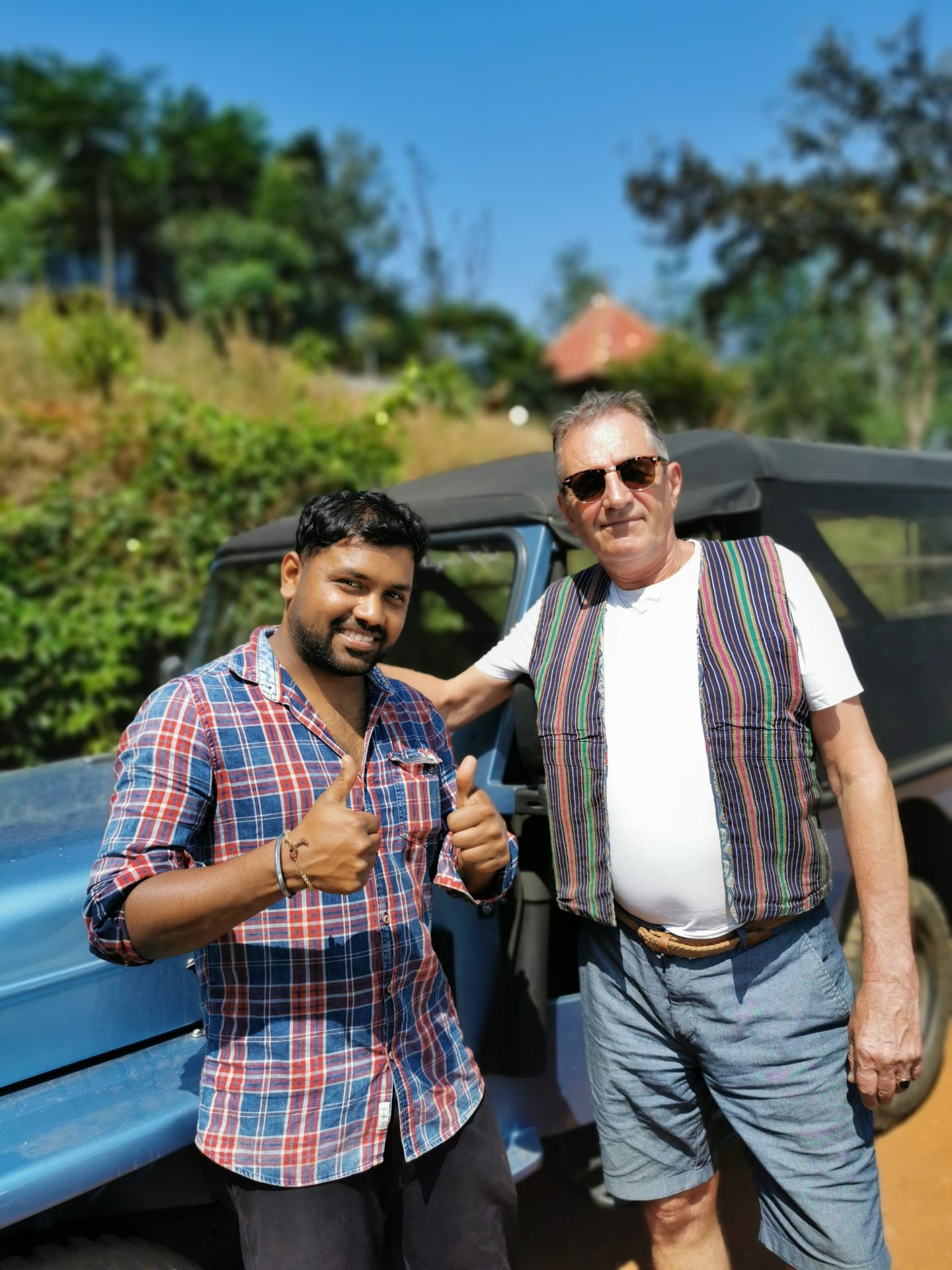
For the next stage of our Indian journey please visit Madikeri, Kushalnagar and Mysore.